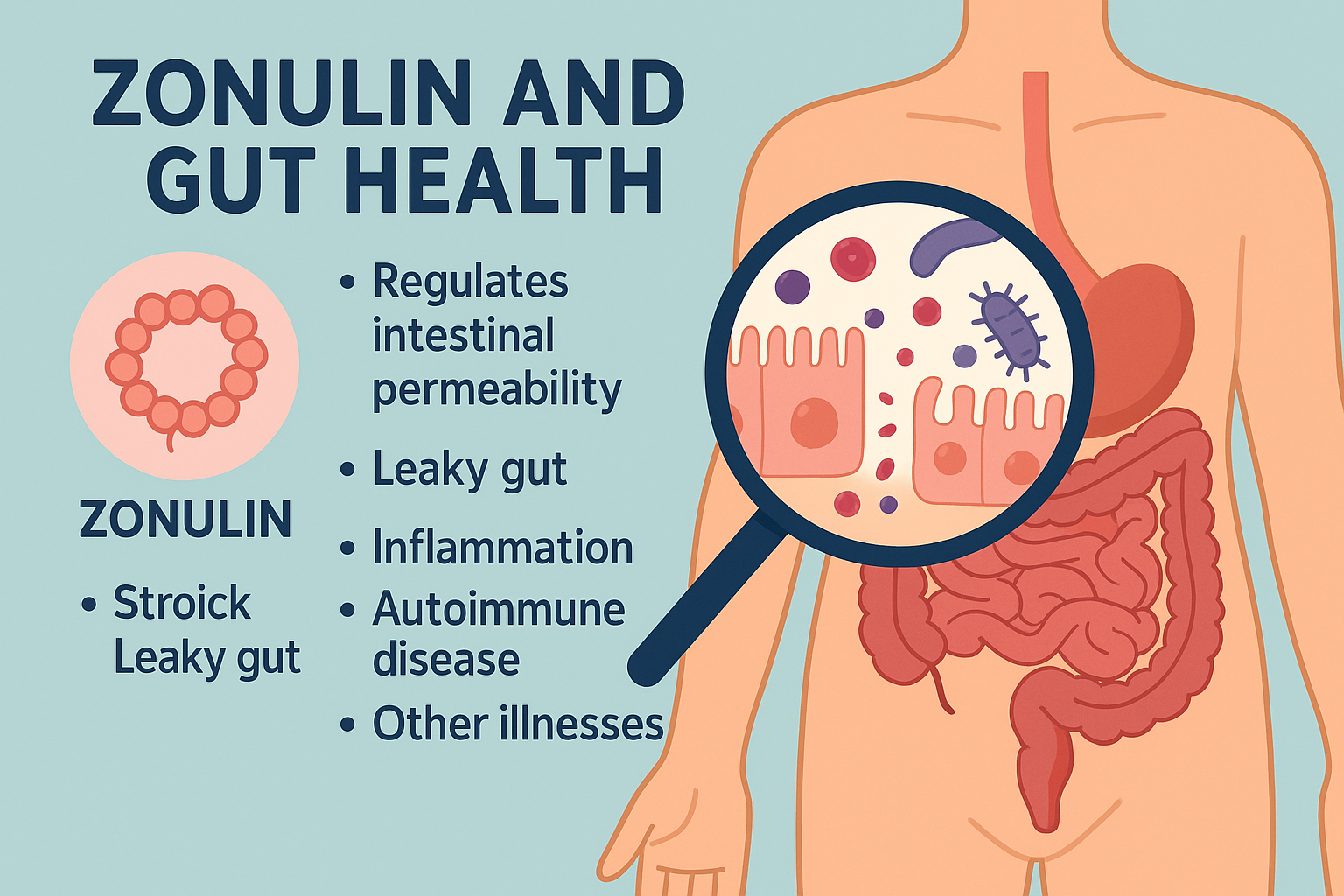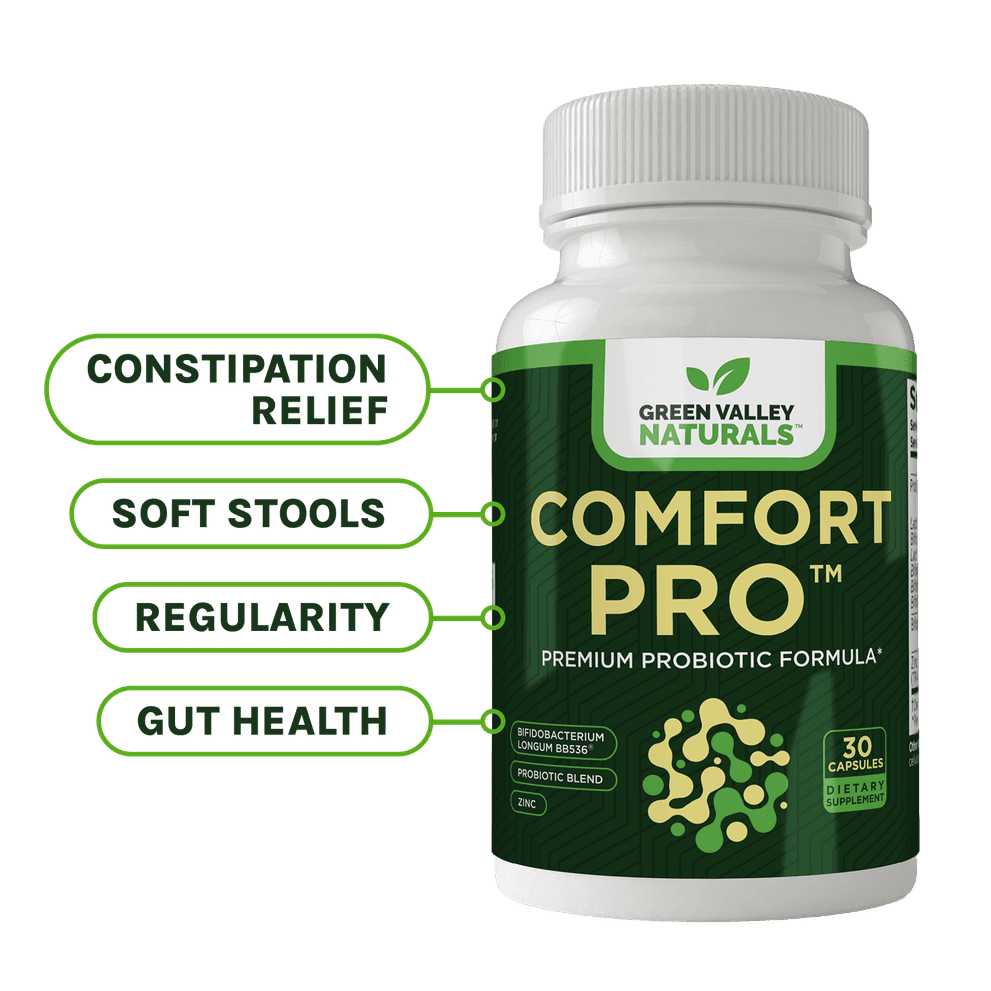
What if a single protein in your body held the power to protect your health—or sabotage it? Scientists have uncovered how this hidden “gatekeeper” can quietly open the floodgates to toxins, inflammation, and chronic disease. The good news? You may be able to take back control. Here's what you need to know.
Key Takeaways
Zonulin is the “gatekeeper” of the gut. It controls tight junctions in the intestines, determining what passes into the bloodstream.
Too much zonulin = leaky gut. Elevated levels are tied to autoimmune and inflammatory diseases like celiac, MS, and diabetes.
Lifestyle matters. A healthy diet, probiotics, exercise, sleep, and stress control can reduce zonulin and protect gut health.
Why Zonulin Matters To Your Health
Zonulin is a protein made by the cells in your intestinal wall, as well as your liver. Your intestinal walls consist of cells known as intestinal epithelial cells. These cells restrict what enters your body from the food you eat and digest, while determining which substances are kept out and eventually eliminated.
Think of your intestinal wall as your body's most important security checkpoint, staffed by specialized guard cells that carefully screen everything trying to enter from your digestive system. These cellular gatekeepers are designed to welcome beneficial nutrients while firmly turning away harmful invaders, such as toxins and pathogens.
Zonulin acts like the head of security, controlling how tightly or loosely the gates between these guard cells are sealed. When everything works properly, only the good stuff gets through while the bad stuff gets shown the door. But when zonulin gets overwhelmed and allows those cellular gates to swing open too wide, it's like having airport security suddenly abandon their posts during a busy travel day. Suddenly, dangerous substances that should never make it past the checkpoint flood into your bloodstream, triggering inflammation and potentially setting the stage for various health problems. This breakdown in your gut's natural border security is why maintaining proper intestinal barrier function is so crucial for your overall health and well-being.
Zonulin is important because it:
Controls gut barrier function - Zonulin regulates tight junctions between intestinal cells, determining what passes through your gut lining
Turns on "leaky gut" - High zonulin allows toxins, bacteria, and undigested food particles to breach your intestinal barrier
Causes autoimmune diseases - Dysregulated zonulin has been connected to celiac disease, inflammatory bowel disease, and other immune disorders
May help solve the worst digestive problems - Scientists continue investigating zonulin's role in chronic inflammatory diseases like Crohn's disease and ulcerative colitis
Leaky Gut: When Zonulin Goes Rogue
When zonulin levels spike and those tight junctions between cells in your intestinal walls loosen up, digestive trouble begins. Those leaks can lay you low with diarrhea, bloating, stomach aches, nausea, and a whole host of other digestive distresses, as well as autoimmune disease.
Two major culprits behind this intestinal chaos are harmful bacteria lurking in your digestive tract and gliadin, a troublesome protein found in gluten-containing foods like wheat, barley, and rye. Gliadin is particularly destructive for people with celiac disease, an autoimmune condition where gluten proteins launch devastating attacks on the body, triggering harmful inflammatory responses. This is precisely why celiac sufferers must maintain strict gluten-free diets.
Some of us have a genetic predisposition toward intestinal permeability, gluten sensitivity, and gut dysfunction, which may lead to chronic inflammation throughout our bodies.
Intestinal diseases themselves can also hijack zonulin release. Beyond celiac disease, elevated zonulin levels serve as inflammatory warning signals in conditions like inflammatory bowel disease, multiple sclerosis, and other autoimmune disorders. Not surprisingly, research shows each of these illnesses has a link to the destruction of that crucial cellular puzzle forming your intestinal barrier.

Zonulin and the Immune System
When the digestive tract is working correctly and small intestinal permeability is under control, zonulin plays a valuable part in supporting the immune system's balancing act in the gastrointestinal tract. The balancing act we're talking about is the careful control that kills and limits harmful bacteria and other pathogens in the intestines while promoting a robust collection of beneficial bacteria (probiotics and other microbes) that cooperate with the immune system for better health.
Researchers believe that when zonulin release loosens the tight junctions between epithelial cells to change intestinal permeability, the wider openings between cells can help nutrients enter the body, can stimulate immune cells to go into attack mode and go after pathogens, and could speed intestinal motility (how fast food passes through you.)
Zonulin's dysregulation can wreak health havoc and can lead to a variety of immune-related illnesses, including autoimmune diseases, inflammatory bowel disease, metabolic issues and more.
Activates your immune army - Zonulin signals macrophages and T cells to launch protective attacks while maintaining cellular balance in your digestive system
Powers rapid-response defense - Zonulin triggers your innate immune system to instantly mobilize against infections before they can establish a foothold and cause serious damage
Since zonulin is so crucial for overseeing the regulation of epithelial tight junctions and influencing immune responses, researchers believe that altering zonulin release and the behavior of zonulin receptors could be useful for treating chronic inflammatory diseases and improving the health of gut mucosa.
Scientists around the world are investigating therapies for limiting zonulin upregulation and reducing zonulin levels, so they can get better control of leaky gut. That entails fighting back back against the increased permeability in the human intestine that leads to inflammatory bowel diseases and other illnesses connected with chronic inflammation.
How Can You Check Your Zonulin Levels?
You can peek behind the curtain of your gut health by measuring zonulin levels through either stool or blood testing. A stool test offers a non-invasive window into whether your zonulin levels are high enough to potentially cause leaky gut, while blood testing requires a simple blood draw but provides valuable insights into your systemic zonulin activity.
Remember, high zonulin levels serve as an early warning system, potentially signaling autoimmune disorders like inflammatory bowel disease, celiac disease, and other conditions linked to compromised gut barrier function. Think of elevated zonulin as your body's way of waving a red flag, indicating it's time to adopt an anti-inflammatory lifestyle and diet.
If you're already managing an autoimmune condition, tracking your zonulin levels becomes like having a health GPS—helping you and your healthcare provider monitor whether your condition is actively flaring up or peacefully in remission. Rising levels might indicate that something in your environment, diet, or lifestyle is disrupting your digestive health and needs attention.
Testing Options:
Home Testing
Convenient stool sampling from the comfort of your home
Results delivered via email
May be less accurate than clinical testing
Good for initial screening or ongoing monitoring
Clinical Testing
Performed by trained healthcare professionals
Available as blood or stool tests
Results reviewed and interpreted by your practitioner
Higher accuracy and comprehensive analysis
Remember, zonulin levels can fluctuate over time, so periodic testing provides a clearer picture of your gut health journey. However, these measurements work best as part of a bigger picture—they need to be interpreted alongside your symptoms and health history rather than as standalone diagnostic tools.
Natural Ways to Lower Zonulin Levels
The good news is that you have more control over your zonulin levels than you might think.
Tests show that zonulin release can be altered by the foods in your diet as well as environmental factors like stress. Stress and consuming excessive amounts of ultra-processed foods can disrupt zonulin's production and activity, resulting in alterations in intestinal permeability and immune responses.3
A combination of targeted supplements, regular exercise, and a gut-friendly diet like the Mediterranean approach can help keep your zonulin levels in the healthy zone.
Supplement Support:
Probiotics act like reinforcements for your beneficial gut bacteria, potentially reducing intestinal inflammation and limiting harmful bacterial infections that spike zonulin levels. That's why Green Valley Naturals Comfort Pro Premium Probiotic formula contains Bifidobacterium longum BB536(R), which has been rigorously researched for bringing gut bacteria back into healthy balance.
Glutamine (an amino acid) supports your gut's good bacteria while strengthening your intestinal barrier's protective abilities.
Larazotide analogues are promising proteins under investigation for their ability to tighten intestinal junctions, particularly beneficial for celiac disease management.
Lifestyle Choices:
Regular exercise emerges as a powerful zonulin regulator—a 3-month University of Toronto study showed that aerobic exercise programs can significantly lower zonulin levels and reduce intestinal permeability.
Gluten-free eating combined with Mediterranean diet principles may help control zonulin release, since gluten proteins in wheat, rye, and barley are known zonulin triggers.
Stress management becomes crucial since chronic stress can hijack normal zonulin function.
Your Action Plan: Taking Control of Your Gut Health
Immediate Steps (This Week):
Assess your current diet - Log what you eat for 3 days, noting processed foods and potential gut irritants.
Start moving - Begin with 20-30 minutes of walking daily to support healthy zonulin levels.
Consider probiotics - Add a high-quality probiotic supplement to support beneficial gut bacteria.
Short-term Goals (Next Month):
Test your zonulin levels - Speak with your healthcare provider about testing options or consider reputable home testing.
Reduce processed foods - Aim to eliminate ultra-processed foods that can disrupt zonulin function.
Implement stress reduction - Try meditation, yoga, or other stress-management techniques daily.
Long-term Strategy (Next 3 Months):
Consider dietary changes - If you have autoimmune conditions, discuss gluten elimination with your healthcare provider.
Monitor progress - Retest zonulin levels to track improvements.
Build sustainable habits - Focus on Mediterranean-style eating with plenty of fruits, vegetables, and legumes.
Red Flags to Watch For:
Persistent digestive issues (bloating, irregular bowel movements, food sensitivities)
Unexplained fatigue or joint pain
Frequent infections or slow healing
New food allergies or sensitivities
Remember, healing your gut isn't about perfection—it's about consistent, sustainable changes that support your body's natural ability to maintain a healthy intestinal barrier. Start small, be patient with the process, and work with healthcare professionals who understand the importance of gut health in overall wellness.
Summary
Zonulin is a protein that regulates intestinal permeability by loosening or tightening the junctions between cells in the gut lining. When overproduced, it leads to “leaky gut,” allowing toxins, bacteria, and undigested food particles to enter the bloodstream, fueling inflammation and autoimmune disease. Elevated zonulin levels are linked to celiac disease, diabetes, multiple sclerosis, Crohn’s disease, asthma, lupus, and even neurodegenerative diseases. Testing zonulin levels in blood or stool can help identify risk, though results must be considered alongside symptoms. Fortunately, lifestyle strategies—including stress management, adequate sleep, regular exercise, a Mediterranean or gluten-free diet, and probiotics—can lower zonulin levels and support a healthier gut barrier. Researchers are also investigating therapies like larazotide analogues and glutamine to regulate zonulin for chronic inflammatory disease treatment.
Frequently Asked Questions
What exactly is zonulin, and what does it do in the body?
Zonulin is a protein that can affect the gut barrier function and gut permeability by loosening the tight junctions between cells in the intestinal lining. It acts like a "gatekeeper," controlling what passes from the gut into the bloodstream. When zonulin levels are elevated, it can cause these junctions to loosen—potentially leading to increased intestinal permeability, or leaky gut.
What causes zonulin levels to increase?
Human zonulin levels can rise (zonulin upregulation) when you eat foods that contain gluten -- proteins found in wheat, barley and rye. People with celiac disease have immune systems that are especially sensitive to gluten and, because of their extreme reactions to gluten, must eat a lifelong gluten-free diet. But other factors can send zonulin levels soaring and trigger immune responses: lack of sleep, gut infections, overgrowth of harmful bacteria in the digestive tract, chronic daily stress, air pollution and exposure to heavy metals along with other environmental toxins. These chemicals and physiological disruptions can signal the body to let substances out of the intestines as a defense response. This immune response interferes with the function of tight junction proteins (which keeps substances in the intestines out of the bloodstream). The resulting release of extra zonulin signals so-called "zonulin receptors" to open the intestinal wall. Chronic activation of these openings leads to leaky gut and long term inflammatory problems.
How is zonulin related to leaky gut syndrome?
Zonulin release leads to leaky gut., It's a pretty dependable indication that you have leaky gut syndrome if you measure your zonulin levels and find them elevated. When zonulin expands the tight junctions between the gut cells that make up the epithelial barrier, it invites bacteria, partly digested food and toxins to surge into the bloodstream. This leads to inflammation that causes or worsens autoimmune diseases.
Can you test for zonulin levels?
Yes, you can use what is called an ELISA (enzyme-linked immunosorbent assay) test to check your zonulin levels in blood or stool. Stool tests can be done at home while health practitioners can perform either a stool or blood test. When your zonulin is high and you are suffering other problems like food sensitivities, autoimmune issues, bloating, indigestion, diarrhea or other discomforts, all those symptoms may signal leaky gut and increased intestinal permeability.
How can I reduce zonulin and support gut health?
One of the first steps to reduce zonulin and support better gut health is to get gluten and ultra-processed foods out of your diet and eat more fruits and vegetables along with legumes. An anti-inflammatory diet like the Mediterranean diet can also be a big help.
In addition, you should also make sure you get enough sleep, reduce your stress and learn stress management techniques. To shore up your gut barrier function, supplements containing zinc, glutamine, probiotics and anti-inflammatory herbs are useful. Studies show that ginger, black tea and peppermint support better gut health and epithelial tight junctions. 7
1 Sturgeon C, et al. "Zonulin, a regulator of epithelial and endothelial barrier functions, and its involvement in chronic inflammatory diseases" Tissue Barriers 2016 Oct 21;4(4):e1251384 https://pmc.ncbi.nlm.nih.gov/articles/PMC5214347/
2 Fasano A, "Zonulin, regulation of tight junctions, and autoimmune diseases" Ann N Y Acad Sci. 2012 Jul;1258(1):25–33. https://pmc.ncbi.nlm.nih.gov/articles/PMC3384703/
3 Gruszecki A. "How do environmental factors contribute to "leaky gut" syndrome?" US Biotek 7/19/2023, https://www.usbiotek.com/blog/how-do-environmental-factors-contribute-to-leaky-gut-syndrome
4 Serek P, et al. "The Effect of Bacterial Infections, Probiotics and Zonulin on Intestinal Barrier Integrity" Int Jrn Mol Sci 2021 Oct 21;22(21):11359 https://pmc.ncbi.nlm.nih.gov/articles/PMC8583036/
5 Deters BJ, et al "The role of glutamine in supporting gut health and neuropsychiatric factors" Food Science and Human Wellness Volume 10, Issue 2, March 2021, Pages 149-154, https://www.sciencedirect.com/science/article/pii/S2213453021000112
6 Feng V, et al. "Impact of 12-week exercise program on biomarkers of gut barrier integrity in patients with coronary artery disease" PLoS One 2021 Nov 19;16(11):e0260165 https://pmc.ncbi.nlm.nih.gov/articles/PMC8604291/
7 Aleman RS, et al. "Leaky Gut and the Ingredients That Help Treat It: A Review" Molecules 2023 Jan 7;28(2):619. https://pmc.ncbi.nlm.nih.gov/articles/PMC9862683/




